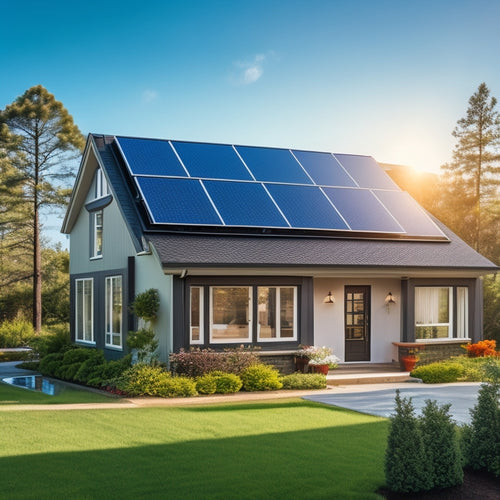
What Is the Cost of a Solar Panel and Battery System
Share
You're looking to install a solar panel and battery system, but what's the cost? You'll need to evaluate the prices of several key components, including solar panels, a charge controller, inverter, battery bank, and mounting system. The average cost of solar panels ranges from $2.50 to $3.50 per watt, so a 5-kW system would cost between $15,000 to $21,000. Add to that the cost of batteries, which can range from $5,000 to $15,000 or more, depending on the technology and capacity you choose. Installation and labor costs can add another $5,000 to $10,000. As you start to tally up these expenses, you'll want to investigate how incentives, financing options, and system configuration can impact your overall investment.
Key Takeaways
- The cost of a solar panel system ranges from $2.50 to $3.50 per watt, with a 5-kW system costing between $15,000 and $21,000.
- Battery system costs vary depending on technology, with lithium-ion batteries being more expensive than lead-acid batteries.
- Installation and labor costs can add 20% to the total system cost, including permits, design, and equipment logistics.
- The total system cost includes equipment costs, installation, and applicable incentives, such as the federal solar investment tax credit (ITC).
- Financing options like loans or power purchase agreements can help spread costs over time, making solar energy more accessible.
System Components and Their Costs
Configuring a solar panel and battery system requires several key components, each contributing to the overall cost. You'll need solar panels, a charge controller, an inverter, a battery bank, and a mounting system.
The type of inverter you choose can greatly impact your system's energy efficiency. String inverters, for instance, are cost-effective but may not be as efficient as microinverters or power optimizers.
When selecting your solar panels, consider the wattage, voltage, and efficiency ratings. Higher-efficiency panels may cost more, but they can generate more power per hour of sunlight.
Your charge controller guarantees that your batteries are charged correctly and safely. Look for a controller with a high maximum power point tracking (MPPT) efficiency rating to minimize energy losses.
Your battery bank's size and type will depend on your energy storage needs. Deep-cycle batteries are suitable for off-grid systems, while lithium-ion batteries are better suited for grid-tied systems.
Average Cost of Solar Panels
When it comes to the average cost of solar panels, you're likely to find a wide range of prices depending on factors such as the type, quality, and brand of the panels.
The cost of solar panels can vary considerably, but on average, you can expect to pay between $2.50 and $3.50 per watt. For a typical residential solar panel system, this translates to around $15,000 to $21,000 for a 5-kilowatt system.
Here are some key factors that influence the cost of solar panels:
-
Solar panel types: Monocrystalline, polycrystalline, and thin-film solar panels have different efficiencies and price points.
-
Energy efficiency: More efficient panels produce more power per hour of sunlight, but are also more expensive.
-
Brand and quality: High-end brands like Tesla and Panasonic tend to be more expensive than budget-friendly options like Renesola and Jinko.
-
Certifications and warranties: Panels with certifications like UL and IEC, and longer warranties, often come at a higher cost.
-
Installation and labor costs: The cost of installation, including labor and permits, can add up to 20% to the total cost of the system.
Battery System Price Factors
Several factors influence the cost of a solar battery system, and understanding these price factors is essential to making an informed purchase decision.
You'll find that the type of battery technology you choose plays a significant role in determining the overall cost. For instance, lithium-ion batteries, which are widely used in electric vehicles, are generally more expensive than lead-acid batteries.
However, lithium-ion batteries offer higher energy storage efficiency, longer lifetimes, and deeper discharge capabilities, making them a popular choice for solar battery systems.
Battery technology advancements have led to increased energy density, allowing for more efficient energy storage in smaller packages. This has driven down costs and made solar battery systems more accessible to homeowners and businesses.
Additionally, the capacity of the battery system, measured in kilowatt-hours (kWh), also affects the price. A larger capacity system will naturally be more expensive, but it will provide more power and backup time during outages.
Installation and Labor Costs
With your solar battery system in hand, the next critical step is installing it correctly to guarantee peak performance and safety.
As you prepare for installation, it's vital to reflect on the costs associated with labor proficiency and installation permits.
These costs can vary depending on your location, system size, and complexity. Here are some key factors to reflect on:
-
Installation permits: You'll need to obtain permits from your local government, which can range from $500 to $2,000, depending on the jurisdiction.
-
Labor proficiency: Hiring a qualified solar installer with the necessary labor proficiency can cost between $2,000 and $5,000, depending on the system size and complexity.
-
System design and planning: A thorough system design and planning phase can add $1,000 to $2,000 to your overall cost.
-
Equipment transportation and storage: You may need to factor in costs for transporting and storing equipment, which can range from $500 to $1,000.
-
Electrical connections and inspections: Making the necessary electrical connections and passing inspections can add another $1,000 to $2,000.
Total System Cost Breakdown
Now that you've accounted for the installation and labor costs, it's time to tally up the total system cost. This includes the equipment costs, which typically make up the largest portion of the overall expense.
The solar panel cost will depend on the type and quality of the panels, as well as the size of the system. Battery costs will also vary depending on the type and capacity of the battery bank. Additionally, you'll need to factor in the cost of inverters, mounting hardware, and any necessary electrical upgrades.
When calculating the total system cost, don't forget to take into account any applicable incentive programs, such as the federal solar investment tax credit (ITC). This can greatly reduce the upfront cost of the system.
You may also want to investigate financing options, such as loans or power purchase agreements, to help spread the cost over time. By tallying up all these expenses, you'll get a clear view of the total system cost and can make an informed decision about whether a solar panel and battery system is right for you.
Frequently Asked Questions
Can I Install a Solar Panel and Battery System Myself?
You can attempt a DIY installation, but it's essential you consider safety precautions, ensuring a secure connection to your electrical grid and proper battery handling to avoid electrical shock, fires, or damage to your system.
Are There Any Financing Options for Solar Panel Systems?
You're likely aware that 80% of homeowners who go solar do so with financing; luckily, you can tap into government incentives and solar loans with competitive rates, making it easier to power your home with clean energy.
How Long Does It Take to Install a Solar Panel System?
You'll typically spend 1-3 days on a residential installation, but your installation timeline can stretch up to several weeks due to installation challenges like complex roofing or permitting issues, so plan accordingly.
Do Solar Panels and Batteries Have Warranties?
You'll find that reputable manufacturers provide warranties for solar panels and batteries, typically offering 25-year warranty duration for panels and 10-year warranty coverage for batteries, ensuring you're protected against defects and performance issues.
Can I Use a Solar Panel System With My Existing Electrical Panel?
You can use a solar panel system with your existing electrical panel if it's grid-compatible, but you may need electrical upgrades to guarantee a safe and efficient connection, so it's crucial to assess your panel's capacity and compatibility before installation.
Related Posts
-

Why Certification Matters for Residential Panels
You're looking to understand why certification matters for residential panels. Basically, third-party certification g...
-

What Are the Average Cost Savings of Solar Panels
You can expect to save between $400 and $1,000 per year on your electricity bills with solar panels, which translates...
-

Solar Power Units Perfect for Homes
You're considering installing a solar power unit in your home, a decision that can notably reduce your reliance on tr...


